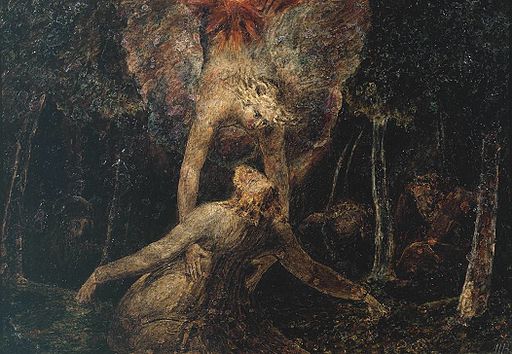
A reading from the Holy Gospel according to Luke:
Then going out, he went, as was his custom, to the Mount of Olives,
and the disciples followed him.
When he arrived at the place he said to them,
“Pray that you may not undergo the test.”
After withdrawing about a stone’s throw from them and kneeling,
he prayed, saying, “Father, if you are willing,
take this cup away from me;
still, not my will but yours be done.”
And to strengthen him an angel from heaven appeared to him.
He was in such agony and he prayed so fervently
that his sweat became like drops of blood
falling on the ground.
When he rose from prayer and returned to his disciples,
he found them sleeping from grief.
He said to them, “Why are you sleeping?
Get up and pray that you may not undergo the test.”
This passage has become my favorite Gospel story, and it contains my least favorite Bible quote.
I am constantly drawn to the image of Christ in Gethsemane: Christ, the all-powerful second Person of the Trinity, overwhelmed with trauma, collapsed in the throes of a panic attack, surrendering all to the love of the Father Whose presence He can know longer feel.
I have often been spiritually abused by the toxic interpretation of that verse, “Father, if you are willing, take this cup away from me, still, not my will, but Yours be done.”
The will of God is something ineffable. It’s one of those things you can’t speak about in human language without being wrong. The only question is whether you’re slightly wrong or completely wrong. There are glorious saints who have come close to getting it right. They have fought to remain faithful to God in the face of terrible suffering and injustice, and they have found God present with them in the suffering, so close to them that the whole of their agony is shot through with the most beautiful light. And they’ve tried to write about these experiences of God, and told us that even suffering can become a gift, because that’s the closest they could get to the truth. And then other people have taken their fumbling to express that beautiful truth, and corrupted it by misunderstanding. Still others have taken the misunderstood truth and used it to abuse on purpose.
I grew up in a culture that thought God willed torture. I was told that God will always send you the worst possible suffering, so you can offer it up. I was taught that saints were people God plunged into particularly horrendous suffering, tormenting them with pains equal to hell itself in order to buy back souls He’d cruelly damned from His own self before it was too late. I internalized the lesson that whatever you dread the most is the cross the Father wishes you to bear, so you can be especially useful in your offering it up to Him. I used to panic when I thought of a particularly terrible scenario, because it was the worst thing I could imagine, and I thought that meant the Father willed it for me.
I thought saying “thy will be done” meant accepting that the Father wills torture.
I’ve met so many other people, who thought that saying “thy will be done” meant accepting that the Father wills torture.
The story that haunts me every year is that of a woman I knew, who was sitting in the church alone, bleeding, in the middle of a miscarriage, wishing for a miracle and knowing it was already too late. She was staring at the Crucifix and she wanted to say an Our Father, but she couldn’t, because she was afraid to say “thy will be done.”
I have found a more excellent way.
If the Father isn’t Love, He isn’t worth my time. Blaspheming a god who isn’t love would be an act of justice, and going to hell for that blasphemy would be a martyrdom. But if the Father is Love, I will do anything for that Father. That Father is worthy of my love. And I don’t have to be afraid of that Father. Because if the Father is Love–real, perfect Love– then Love can only will good for the beloved. Love would never intend something as hellish as I was taught growing up.
By some profound mystery, suffering still exists. I can’t explain that. I don’t know that I will hear a sufficient explanation for it in this world or the next. But it’s real. And if the Father is Love, then the Father never wills it. He might will a thing that is good but passes through suffering on the way, but He couldn’t will the suffering.
Still, suffering happens anyway.
And the Father, in His infinite love, wills that when suffering is inevitable, suffering be transformed into grace.
If “Father, if you are willing, take this cup away from me, still, not my will, but Yours be done,” means that the Father willed to torture the Son, then the Father is worse than the devil, and the Passion of Christ is just an abusive father torturing his child.
But if “Father, if you are willing, take this cup away from me, still, not my will, but Yours be done” means “Father, if You can, send a miracle so I don’t have to suffer this, but if somehow you can’t, let Your will be done in the suffering,” then God is Love, and the Passion of Christ means that everything is grace.
If God is Love, then the Father didn’t will for the people to rise up and crucify His Son. He willed that, if it came to that, His Son would rise from the dead, and bring everyone who did not want to stay dead with Him.
If God is Love, then the Father didn’t will for the Son to descend into hell. He willed that, if the Son did descend into hell, that descent would be the harrowing of hell.
If God is Love, then the Father doesn’t will me to suffer the things I am suffering. He wills that, when the suffering He doesn’t want comes anyway, He will be there in it with me, transforming it into grace.
No other god is worthy of our worship: only the God Who is Love.
This is me trying to find words for an ineffable thing, and I’m sure I’ve gotten it a bit wrong. But not as wrong as the version of the Gospel I was raised to believe.
If God is Love, then this passage is the most beautiful in all of the Gospel.
If He isn’t, the Gospel is worthless.
But I think that God is Love.
Steel Magnificat operates almost entirely on tips. To tip the author, visit our donate page.













